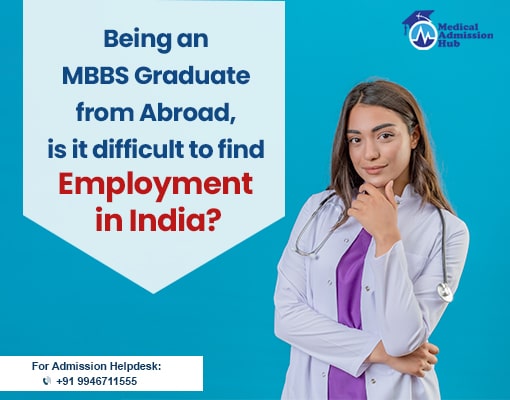Being an MBBS graduate from Abroad, is it difficult to find employment in India?
The amount of students who are pursuing MBBS is increasing globally. Rather than choosing the Indian medical system for their career, most of the students opt for abroad studies and systems. Even though the syllabus and education systems are comparatively different from India, It is worthful to have a degree from abroad. Infrastructure, divergent exposures, modern training, and wide opportunities attract Indian students to seek education in foreign countries and eventually, they choose to expand and build their careers abroad.
There is a wide range of opportunities to study MBBS in abroad for Indian students at low costs. The universities will assess the potential of the student through certain tests like IELTS, TOEFL, OET, etc, will go through their academics, and provide them with appropriate scholarships and guidance for their future studies, if they are eligible. The top abroad medical universities provide ultramodern facilities with quality medical education at affordable MBBS fees for their International students. Every student who chooses to study MBBS in abroad has to select a genuine and faithful country for their studies. Georgia, Russia, China, Kyrgyzstan, Ukraine, Armenia and Bangladesh, etc are some of the top destinations as well as the best countries for MBBS for Indian students. In India, the number of students applying for medicine is comparatively higher than the number of medical seats. More than 5000 Indian students join the medical universities of these countries every year with the hope of an excellent education and results.
Choosing India to work after studying MBBS abroad is a bit challenging. It is not something impossible. But still, the student will have to fulfill certain requirements and complete certain procedures and formalities before starting their medical career in India. First of all the student will have to pass the Foreign Medical Graduate Examination (FMGE) conducted by The National Board of Examinations (NBE) in order to register with the Medical Council of India (MCI) or the State Medical Council (SMC) where the student wishes to practice. The examinations will assess the student’s knowledge of medical subjects taught in India. Medical graduates with MBBS degrees from abroad are able to return to India and work either in private or public hospitals, after clearing the NMC (National Medical Commission) exam. Additionally, they are capable to attend the UPSC exam and are eligible to work in India.
The MCI screening test is notoriously challenging, with a feeble pass rate, and it creates a significant hurdle for International Medical Graduates (IMG). In addition to the difficulty of the test itself, the test is held only twice a year, so candidates have to wait for several months before they can retake the exam. The delay in attending the test and obtaining the registration can result in a gap in employment that can make it more difficult to secure a job. One of the major obstacles IMGs may face is the perception that their education qualification may not be equivalent to that of Indian medical graduates. Even though it is something not true, as the medical programs of foreign countries are of excellent quality, this is a perception that is difficult to overcome. Indian employers might be hesitant to hire IMGs, especially if they are unfamiliar with the circumstances of the institution where the candidate studied or the curriculum followed. After passing FMGE, the student needs to complete a compulsory rotating internship of one year in a recognized hospital in India. Once the internship will be completed, the student will be eligible to apply for permanent registration with the MCI or the SMC. Apart from these requirements, the person needs to fulfill the eligibility criteria as specified by the government as well as private hospitals and clinics. The person should be updated on advances and technologies in the field of medical science
Furthermore, Indian medical institutions and hospitals might prefer to hire Indian medical graduates due to their familiarity with the Indian healthcare system and ease of communication. Employers prioritize those who have completed their medical graduation from India, as they are more aware of the social situations prevailing in India.
Additionally, the number of unemployed medical graduates is comparatively very high. Even though there was a surge in the number of medical colleges in India, resulted in high competition among medical graduated job seekers for limited job opportunities. And as a result, in highly competitive cities, where the demand for healthcare is highest, many graduates have to settle for less desirable positions.
Finally, the remuneration for medical professionals in India is comparably very less than professionals from other countries, and this can be a restraint for IMGs who have invested a significant amount of money and time in their education. Although the salaries for Indian doctors have been increasing recently, they are still significantly lower than in countries like the UK, the US, or other developed countries.
In conclusion, obtaining a job in India after the MBBS studies from abroad is difficult, but it is not something impossible. IMGs should be prepared to take the MCI screening test and should need to invest much more time, attention, and effort in preparation. It is essential to showcase the skills and qualifications effectively to potential employers and to network with other medical professionals. While the competition in the field may be high, there are still wide opportunities for those who are determined and persistent. Ultimately, success in finding employment in the medical profession in India will depend on a combination of factors, including qualifications, experience, persistence, and perspiration.
The reason why most Indian students would like to pursue their medical dreams abroad is not just the lack of a proper Indian medical system, but also the improper functionality, scarcity of seats, tough competition as well as the collection of unemployment, which leads them to choose a bright career abroad. MBBS education consultants in Kerala open wide options of education opportunities in Western countries that will broaden a fruitful future for students, especially in the field of medical science.


